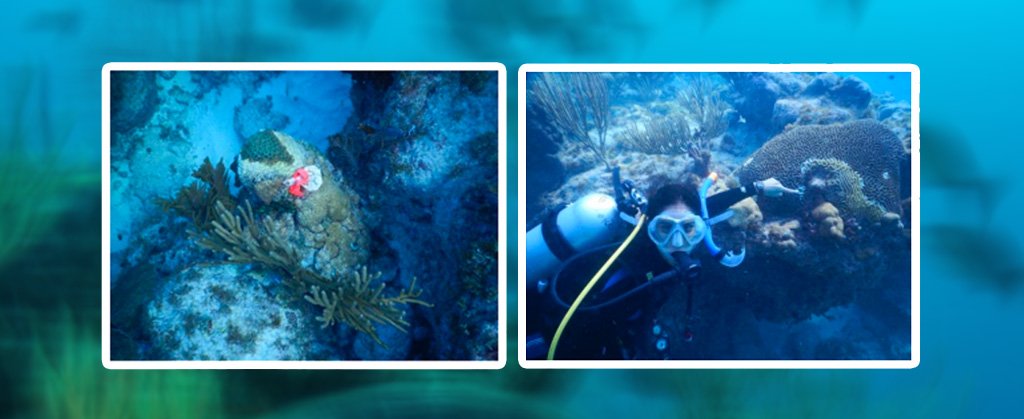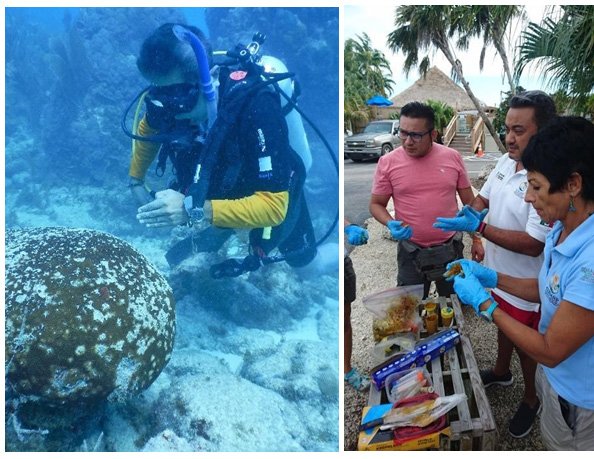Tackling new threats to Caribbean coral reefs

Photo: Emma Doyle

Key Largo, December 11, 2018 – Managers from four Mexican marine national parks are visiting the Florida Keys for a technical exchange to address an emerging threat posed to coral reefs by a coral disease that was first documented in Florida and is being now reported in other parts of the Caribbean.
Marine natural resource managers from the Caribbean have expressed concern about the spread of a previously unknown coral disease that has recently been identified in Florida. The Stony Coral Tissue Loss Disease spreads rapidly and affects some of the slowest-growing and longest-lived reef-building corals, including the iconic brain corals, star corals and pillar corals. Scientists are still uncertain about the cause of the disease.
“It seems that the threats to our reefs never cease. In Mexico we are very concerned because the disease has been seen since May 2018 at various sites,” commented the representative from Parque Nacional Arrecife de Puerto Morelos, who is a member of the coral disease working group for the Mexican National Commission for Protected Areas, CONANP (from its initials in Spanish).
Given that this disease is appearing in other parts of the Caribbean, Mexico has initiated a regional monitoring program and is actively networking with international colleagues. This will permit early detection of the disease and enable international cooperation between experts in affected countries, with the aim of taking action to mitigate, restore and evaluate damage to coral reef ecosystems.
“Through this visit we’re gaining vital new technical knowledge for the detection and correct identification of the stony coral tissue loss disease. Local experts have shared with us their latest approaches to the treatment, follow-up attention and monitoring of affected corals,” explained the representative from the National Park Costa Occidental de Isla Mujeres, Punta Cancún y Punta Nizuc.
The group is seeing first-hand the impact of this threat to Florida’s coral reefs, and the likely cascading impacts on fisheries and tourism sectors. Together with experts and managers from the US, the visitors are also examining management strategies to help prevent further spread of the disease, for example through disinfection of dive equipment and better management of ballast and waste water from ships. Important lessons that have been learned in Florida are being shared with Mexico about early action planning, inter-agency collaboration, the prioritization of sites for treatment, and communications with fishers and divers.
“While we work to address this new disease, we have to do everything possible to build the resilience of reefs by reducing the other threats that are well known to us. This means ensuring compliance with fisheries regulations, as well as respecting the conservation zones of our national parks, and applying best practices in marine tourism,” added the representative from Arrecife Alacranes National Park, Cristóbal Cáceres.
“Given the significance of coral reef ecosystems, it’s necessary that we join forces with scientists, communities and the various authorities involved to find possible solutions to this issue,” commented the representative from Arrecifes de Xcalak National Park and the Biosphere Reserve Banco Chinchorro.
Marine national park managers from 10 countries and territories in the Caribbean region are connected through MPAConnect, a partnership between the Gulf and Caribbean Fisheries Institute, the NOAA Coral Reef Conservation Program and 30 marine national parks regionally. The exchange visit between Mexico and Florida was organized by MPAConnect, in an effort to respond quickly to a critical need for technical information about the disease and to share evolving management experience between nations. Thanks to Nova Southeastern University for sharing with the group.

Coral reef disease inspection at Looe Key, Florida Keys National Marine Sanctuary and training in disease treatment protocols.
Photo: Emma Doyle
For more information please contact mpaconnect@gcfi.org.
Tags: MPAConnect, NOAA Coral Reef Conservation Program, Nova Southeastern University, Stony Coral Tissue Loss Disease



